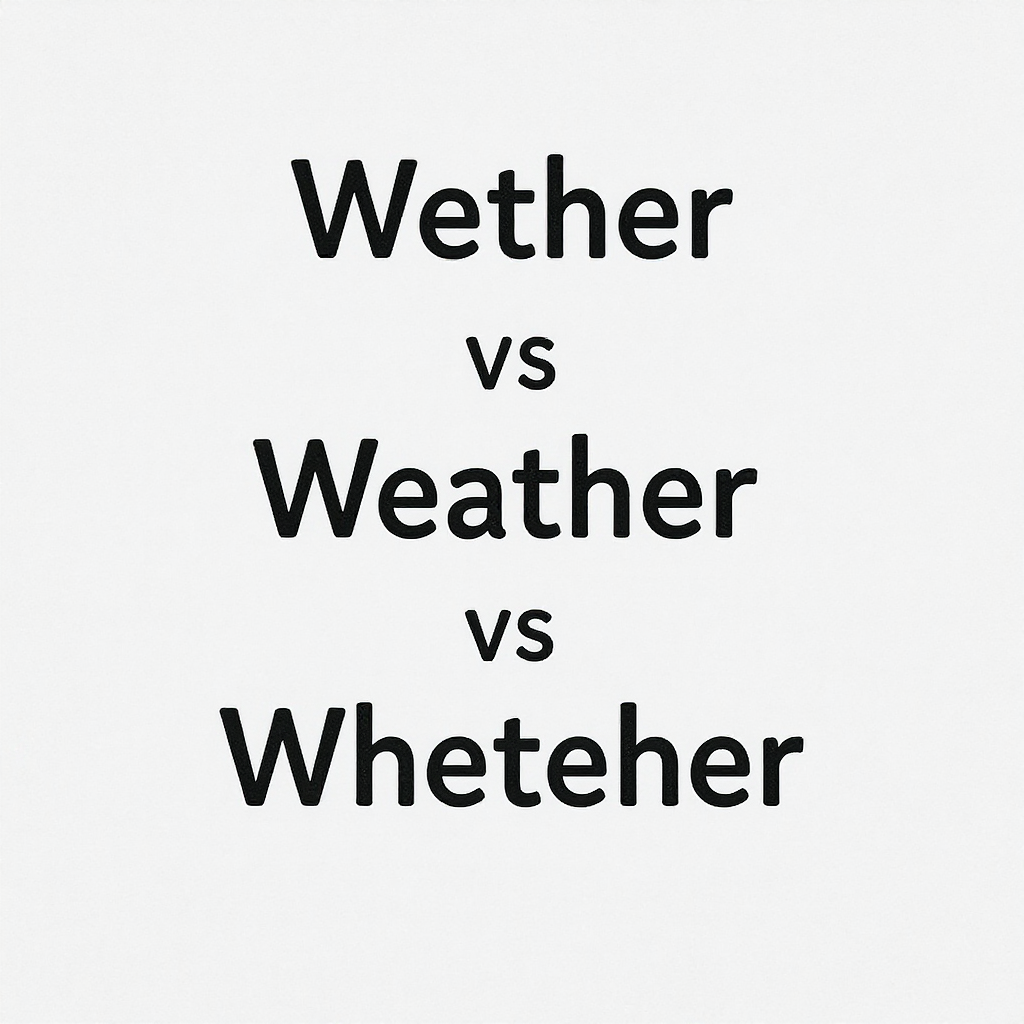"Wether" Vs "Weather" Vs "Whether" - What’s the Difference?

English is full of words that sound the same but mean very different things. These are called homophones, and they often cause trouble for learners. One classic example is the trio: wether, weather, and whether.
They may sound alike, but they don’t share the same meaning or spelling. Don’t worry — Midoo AI will walk you through the differences with simple definitions, examples, and memory tricks. By the end, you’ll always know which one to use.
What Does “Wether” Mean?
Let’s start with the rarest one: wether.
A wether is a castrated male sheep or goat. This word is almost never used in daily English unless you are talking about farming, animals, or agriculture. Most people will never need to write this word unless they work with livestock.
Examples of “Wether”:
- The farmer kept the wether separate from the other sheep.
- A wether is calmer than a ram.
- Shepherds sometimes use a trained wether to lead the flock.
- The vet explained that a wether cannot breed.
- Few English learners will ever need the word wether.
👉 Unless you’re on a farm, you can safely forget about this word most of the time.
What Does “Weather” Mean?
Weather refers to the conditions outside, such as sunshine, rain, snow, wind, or temperature. This is the word you’ll use often in everyday English.
Examples of “Weather”:
- The weather is sunny today.
- Bad weather delayed the flight.
- She always checks the weather before going hiking.
- The stormy weather kept us indoors.
- Cold weather makes me want hot chocolate.
👉 Weather = the sky outside. Easy!
What Does “Whether” Mean?
Whether is a conjunction. It is used when you are talking about choices, possibilities, or doubts.
Examples of “Whether”:
- I don’t know whether to stay or go.
- She asked me whether I liked the movie.
- We’re deciding whether to travel this weekend.
- He’s unsure whether it will rain.
- Let me know whether you want tea or coffee.
👉 Whether = choice or possibility.
Memory Tricks
- Wether → sheep 🐑 (so rare you probably won’t need it unless you’re a farmer).
- Weather → sky 🌦️ (rain, sun, snow).
- Whether → choice ❓ (this or that).
You can even remember it like this:
- Weather has an “a” = atmosphere.
- Whether has “h” = hard choice.
Quick Reference Table
| Word | Meaning | Example |
|---|---|---|
| Wether | Castrated male sheep or goat | The wether led the flock. |
| Weather | Outside conditions (rain, sun, etc.) | The weather is rainy today. |
| Whether | Choice, doubt, or possibility | I don’t know whether to stay or go. |
Common Mistakes
❌ I don’t know wether it will rain. ✔️ I don’t know whether it will rain.
❌ The wether is sunny today. ✔️ The weather is sunny today.
❌ The farmer owns many weather. ✔️ The farmer owns many wethers.
FAQs
Is “wether” a misspelling of “whether”?
Most of the time, yes. Learners often type wether when they really mean whether.
Do I ever need the word “wether”?
Only if you’re writing about sheep or goats in farming or veterinary contexts.
Which is more common: “weather” or “whether”?
Both are common, but they mean completely different things. Weather is about the sky; whether is about choices.
Can I use “if” instead of “whether”?
Sometimes. For example, I don’t know if he’ll come = I don’t know whether he’ll come. But “whether” sounds more formal and precise.
How can I quickly check if I’m using the right word?
Ask yourself: Am I talking about sheep (wether), the sky (weather), or choices (whether)? That will guide you.
Final Thoughts
Even though they sound the same, wether, weather, and whether each serve a different purpose in English. Most of the time, you’ll only need weather and whether.
- Use wether only for sheep.
- Use weather for the sky.
- Use whether for choices.
Midoo AI recommends practicing by writing three short sentences — one with each word — so your brain remembers the difference forever.